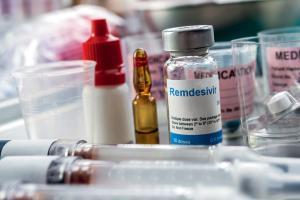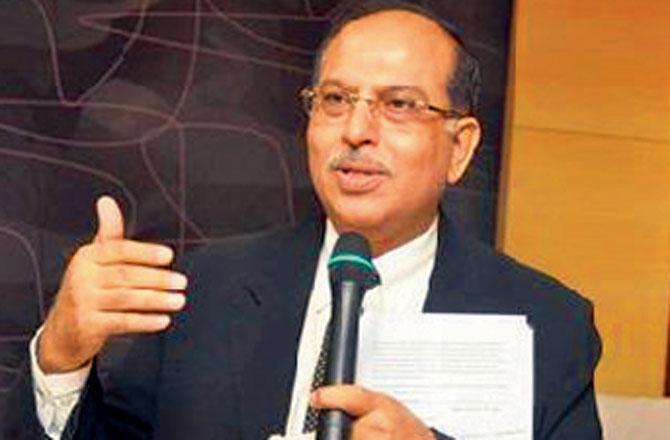After opposing stands on remdesivir by the World Health Organization and US Food and Drug Administration, and on the efficacy of other drugs used to treat COVID-19 by other agencies, doctors question why science and medical institutions have failed t

The WHO's Solidarity trial showed that remdesivir neither improves survival nor reduces the duration of stay in the hospital. Pic/Getty Images
Two global leaders, WHO for public health, and USFDA for scientific validity of food, meds, vaccines, and diagnostics appear to be taking diagonally opposite stands on repurposed medicines. That too, at a time when there are no scientifically established medicines against COVID-19 to date, Health experts in India, now say that it is time for all world leaders of science and governments to reconnect and introspect as to why all the best science and medical institutions have failed to throw up viable solutions (other than elusive vaccines) for COVID-19 and other impending pandemics, amidst different views on . Also will take legal view on drugs being administered to millions of Covid 19 patients, which get rejected by WHO or gets sanction from US FDA, what rights to patients have?
Dr Wiqar Shaikh, senior allergy and asthma specialist said, “The recent approval, of Remdesvir, by the US FDA, has the first drug to treat covid 19 comes as a complete surprise. Indeed, this is more shocking because the ‘solidarity’ trial by the WHO of which the data was released just a few days ago had thrashed both Remdesivir and HCQs in Covid 19 treatment. The WHO chief scientist Dr Soumya Swaminathan has stated that the solidarity trial, had robust results, and that Remdesivir, neither improves survival nor reduce the duration of stay in the hospital. Remdesivir also did not reduce the initiation of ventilator in those patients, not already on a ventilator support. She also observed that the US FDA appears to have not considered, the results of the WHO solidarity trial, before granting full approval to Remdesivir.
ADVERTISEMENT
Even more shocking are the results of atleast five trials, in various leading medical journals Lancet, New England Journal of Medicine and Journal of the American Medical Association, which conclude that Tocilizumab the IL-6 inhibitor which was used in critical patients with Covid 19 has no efficacy, it does not reduce patient mortality and on the contrary has adverse effects.
The contradictory action by two major organisation the WHO and US (FDA) both of which are followed by not only the medical profession but also by the general public world wide, this is a matter of concern. Since , the onset of this pandemic, critical patients, around the world with covid 19, have been injected with Remdesvir and Tocilizumab, millions of dollars, have been spent by people all over the world in purchasing these two drugs, including inn India, said Dr Shaikh.
He further stated, ‘HCQ’s has also been extensively prescribed for Covid 19, but now the WHO says, it has no benefits. Besides, several studies, including the AIIMS, Delhi study have shown that plasma therapy doesn’t give any benefits in covid 10 patients, and we do know that in India, Plasma therapy has been touted, as a treatment for covid.”
Dr Shaikh continued, “We are aware that the United Stated has quit the WHO, but for a scientific body, such as the US (FDA) to have exactly the opposite opinion on Remdesivir as a first drug for covid 19, when compared, to the data from the WHO, is not exactly scientific, as WHO has in the solidarity test taken view of 30 countries in 405 hospitals, post which the statement was made.”
Six moths ago, Remdesivir, HCQs, Tocilizumab, and plasma therapy were promoted all over the world as effective treatment for covid 19. Suddenly, these drugs have been pronounced as duds.
Patients with Covid 19, and their relatives in India have spent huge amounts in procuring Remdesvir, and Tocilizumab many of them from blackmarketers, these patients in India, who were injected these drugs should now be eligible for appropriate compensation. Even more shocking is that the ICMR and the National Task Force on Covid 19 are silent on this subject. In the light of the WHO solidarity trial findings, it is imperative that the ICMR and National Task Force, act immediate. Why is there not a firm advice / order to medical practitioner, hospitals and State Task Force and State FDAs to remove these drugs from the recommended list of covid 19 treatment, asked Dr Shaikh?
Shaikh further added, These drugs which are still approved in India, on an experimental basis should not have been allowed, I the first place, to be presrcribed to the general population without conducting a proper trial. Also now that all the studies, so far, have shown the inefficacy of these drugs , it imperative that we study the short term and long term side effects of these drugs on human body particularly those patients, who have been administered these drugs. We also need to effectively formulate, a strategy to treat, such future pandemics through a governmental body, so that the patients are not endangered for unseen side effects.
Hurried trashing of ‘repurposed meds for treatment of COVID-19’ can be hazardous! Says Dr Subhash Hira

Dr Subhash Hira, professor of Global Health at the University of Washington-Seattle
“Just a week ago, the premiere health agency of the world, namely the WHO that is the global regulator of ‘International Health Regulations’ during a global emergency or pandemics such as the COVID-19, announced trashing several ‘repurposed meds’ such as Ramdesivir, Hydroxychloroquin, lopinavir/r, and interferon being found ineffective in the global Solidarity trial conducted in 305 hospitals. The two main criteria used for evaluating effectiveness of these meds were the number of deaths and days of hospitalization of patients while on these meds. Just then, on 23rd of October 2020, the USFDA, a statutory body of United States government that is responsible for evaluating clinical trial results and thereafter issue licenses to meds for use against specified diseases, gave the effectiveness license to Ramdesivir for its use against COVID-19! The rigor, meticulous depth, and evaluation process of USFDA is globally respected. Strangely, two global leaders, WHO for public health, and USFDA for scientific validity of food, medicines, vaccines, and diagnostics appear to be taking diagonally opposite stands on repurposed medicines! That too, at a time when there are no scientifically established medicines against COVID-19 to date,” said Dr Subhash Hira, Professor of Global Health at the University of Washington-Seattle, USA and former health specialist of the World Bank HQ and WHO, and currently health advisor to several UN, Indian and African health agencies.
Said Dr. Hira, “Another example of diverse scientific support to another ‘repurposed medicine’ is of Tocilizomab. This medicine is used extensively in Rheumatoid arthritis globally to neutralize auto-antibodies that are triggered by Interleukin-6 by dying cells. While doctors using Tocilizumab for COVID-19 patients having lung pneumonias under experimental licensing of USFDA and DCGI-India had reported several benefits, a lone clinical trial published in NEJM on 21st October 2020 showed little benefit against a placebo on two clinical counts. However, treating doctors believe that Tocilizumab gives useful results, and also can be useful backup in case of failure of steroid in pulmonary pneumonias. In the absence of any alternatives, hurriedly trashing away the ‘repurposed medicines for the treatment of COVID-19’ can be dangerous.”
Said Dr. Hira, “Over this weekend, I attended the virtual National Academy of Medicine annual conference from its office in Washington DC. I heard the accomplished speakers describing the worst COVID scenario that is yet to come. But all speakers lacked the futuristic vision and solutions that we all had expected to hear from them so as to overcome the pandemic. Instead, the world witnessed scientists and front line COVID warriors being called names out of frustration and helplessness of world leaders! It’s time for all world leaders of science and governments to reconnect and introspect as to why all the best science and medical institutions have failed to throw up viable solutions (other than elusive vaccines) for COVID-19 and other impending pandemics.”
Legal Expert view

Solicitor Stuti Galiya
Solicitor Stuti Galiya, whose specialise in Corporate Commercial legalities, said, “Drugs and plasma therapy which are currently being used for the treatment of COVID-19 pandemic are still at an experimental stage and have not been established for use by any of the regulatory authorities across the world, including in India. Generally speaking, where a new drug is proposed to be introduced in India, there are certain mandatory norms which need to be followed, before it could be put to use. These requirements are provided under the Drugs and Cosmetics Act, 1940, which provide for mandatory requirement of local clinical trials (unless this requirement is waived for one of the reasons provided under the Act). There are detailed guidelines which are provided with respect to conducting such clinical trials. These are various phases of the trial which are provided specifically with a view to strictly monitor the trials, establish safety and efficacy of the concerned drug, thoroughly understanding the problems and risks or benefits of a particular therapy and finally ensuring that the chosen therapy method is scientifically sound and ethically justified, before the drug is finally put to use. In other words, new drugs approved for use in select developed markets are not automatically allowed in India provided global trials includes Indian patients. This requirement is applicable for new drugs manufactured in India as well.”
Solicitor Stuti added, “Recognizing the public health emergency situation and having regard to the fact that experimental drugs/therapy will be required to put to immediate use, pending clinical trial process, many regulatory bodies across the world, such as the (US) Food and Drug Administration Authority (FDA) have issued guidance thereby providing recommendations to health care providers and investigators for using such experimental drugs/therapy during such emergency situations. The guidance has been issued with a view to ensure that there is interim compliance and internal check and balance whilst using such experimental drugs, thus precluding random and uncontrolled usage of such drugs.”
Considering the peculiar circumstances that the covid situation has brought, it is important that the Ministry of Health & Family Welfare issues such similar detailed and comprehensive guidance to control the unchecked use of such investigational drugs, whose possible side effects (which may not be studied at this stage) may outweigh the benefits. Whilst experiments, trials and investigations are being conducted across the globe, it is important that green-light for indiscriminate use of such unproven drugs is not given. This issue becomes specially germane, considering that there have been claims and counter claims with respect to use of such drugs and possible risks/side-effects. It is important that usage of such drugs is accompanied by stringent checks and balances, such as, careful monitoring of the drug’s effects and seeking informed consent from the patients, before administering such drug.
Rights of Patients
According to Solicitor Stuti, In India, there are various legal provisions related to patient’s Rights which are scattered across gamut of laws, for example, Article 21 of the Constitution of India, the Indian Medical Council (Professional Conduct, Etiquette and Ethics) Regulations 2002, the Consumer Protection Act 2019, the Drugs and Cosmetic Act 1940, the Clinical Establishment Act 2010 and rules and standards framed therein. Apart from this, various judgments given by courts in India (more so, being the Supreme Court of India and the National Consumer Disputes Redressal Commission) have time and again stressed upon the importance of informed consent. Informed consent means that everyone consuming the drug must do so only after fully understanding its benefits and harm. Hospitals/health care providers need to clearly lay down in simple language to the patients/their immediate relatives about the investigational nature of the drug and explain all the risks, consequences, benefits and alternatives available before such use. The Supreme Court of India has adopted the threshold of ‘real consent’ similar to the UK. In the case of Samira Kohli vs Dr. Prabha Manchanda & Anr., it has been observed that before any medical treatment the consent obtained should be real and valid, which implies that the patient should have the capacity to consent, consent should be voluntary, consent should be based on adequate information concerning the nature of the treatment procedure so that he knows what he is consenting to.
Informed Consent
However, according to Stuti, the issue relating to procuring informed consent has been subject to various challenges in recent times, considering the unique situation covid pandemic has posed across the globe. Procuring such consent becomes a challenge, specially considering the illiterate population of India who may not be able to understand the technicalities involved, or in situations where the patient is critically ill and is on oxygen support. The patient’s condition may be quite vulnerable, which could have an impact on their decision making capacity. In such cases, consent could be obtained from the patient’s family members/legally acceptable representatives. This also becomes a challenge when the family members/legally acceptable representatives have themselves been quarantined or are hospitalized. In such cases, consultation and procuring consent by electronic mode should be undertaken, which should be recorded.
“It is important that the Ministry of Health & Family Welfare issues detailed guidance/regulations incorporating these clinical good practices which need to be followed by health care industry, to avoid ambiguities and uncertainties in future, specially in light of the unique situation the world is grappling with in view of the pandemic situation. With the new normal, this will go a long way in ensuring highest degree of transparency, faith in healthcare system and regard for human rights,” Galiya concluded.
Keep scrolling to read more news
Catch up on all the latest Mumbai news, crime news, current affairs, and a complete guide from food to things to do and events across Mumbai. Also download the new mid-day Android and iOS apps to get latest updates.
Mid-Day is now on Telegram. Click here to join our channel (@middayinfomedialtd) and stay updated with the latest news
 Subscribe today by clicking the link and stay updated with the latest news!" Click here!
Subscribe today by clicking the link and stay updated with the latest news!" Click here!







